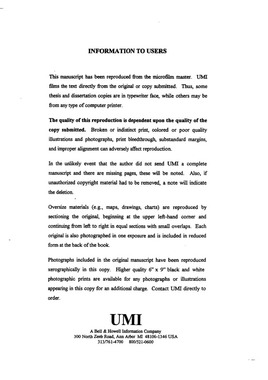| dc.contributor.advisor | Haring, Kathryn, | en_US |
| dc.contributor.author | Maddox, June Irene. | en_US |
| dc.date.accessioned | 2013-08-16T12:29:34Z | |
| dc.date.available | 2013-08-16T12:29:34Z | |
| dc.date.issued | 1997 | en_US |
| dc.identifier.uri | https://hdl.handle.net/11244/5450 | |
| dc.description.abstract | Early childhood special education teachers who perceive children's behaviors as communications respond accordingly. Mothers and teachers respond to perceived child behaviors as communications when they contingently respond to those communications. Further support for the development of child communication depends upon the efforts of families and school personnel as individuals recognize child communications and respond in predictable ways. It would seem important that adults in the child's environment agree on the child's communication means and their communicative functions. | en_US |
| dc.description.abstract | The combined responses of the participating mothers identified more child communication means than participating teachers. Both groups agreed on the functions of the children's communicative behaviors. Wide variability was found among participant-pair descriptions of specific children's communications. Communication statements found in the children's IEP documents were not generally found to be associated with the child's level of communication as it was perceived by a participant-pair. While some IEP statements addressed the child's perceived communication means and functions, the majority did not. | en_US |
| dc.description.abstract | This study asked mothers and preschool special education teachers to describe the communications of young children with severe, multiple disabilities. Each participant-pair completed a survey instrument and participated in a structured interview as they described seven children's communicative behaviors (means) and the function of those communications. | en_US |
| dc.description.abstract | Communication development for children begins with the early interactions of mothers and their infants. This developmental process between mothers and their infants is altered when an infant is born with severe disabilities, or encounters some devastating environmental impact early in life. Mother-child interactions are disrupted when the child does not respond to the mother in expected ways. Children with severe, multiple disabilities may exhibit a limited repertoire of behaviors; mothers may be unable to "read" the behaviors as infant communications. Mothers then begin to identify more subtle behaviors as communication and assign them meaning. | en_US |
| dc.format.extent | xiv, 205 leaves ; | en_US |
| dc.subject | Children with disabilities Language. | en_US |
| dc.subject | Education, Early Childhood. | en_US |
| dc.subject | Preschool children. | en_US |
| dc.subject | Education, Special. | en_US |
| dc.subject | Communication. | en_US |
| dc.subject | Speech Communication. | en_US |
| dc.title | Mother and special education preschool teacher perceptions of the communicative competence of children with severe, multiple disabilities. | en_US |
| dc.type | Thesis | en_US |
| dc.thesis.degree | Ph.D. | en_US |
| dc.thesis.degreeDiscipline | Department of Educational Psychology | en_US |
| dc.note | Source: Dissertation Abstracts International, Volume: 58-02, Section: A, page: 0422. | en_US |
| dc.note | Adviser: Kathryn Haring. | en_US |
| ou.identifier | (UMI)AAI9722339 | en_US |
| ou.group | Jeannine Rainbolt College of Education::Department of Educational Psychology | |
